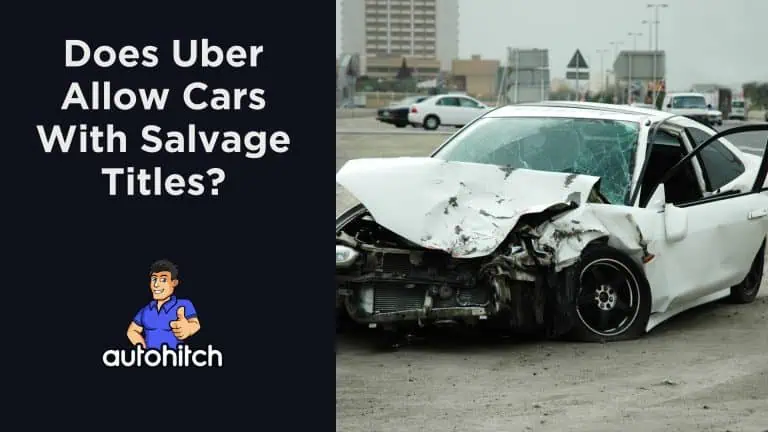No, Uber does not allow salvage title cars.
Uber has strict vehicle requirements that prohibit salvaged or rebuilt vehicles from being used on their platform.
According to Uber’s website, “Title cannot be salvaged, reconstructed, or rebuilt.” The policy seems to be aimed at ensuring passenger safety and limiting liability risks.
However, some drivers still attempt to use salvage title vehicles for Uber despite the risk of being deactivated if caught, and it doesn’t seem Uber is always able to catch them.
That being said, Uber’s software does randomly scan VINs to check drivers’ title status, but based on forum discussions, it sometimes misses salvaged vehicles and actually incorrectly flags clean titles as branded.
Related Articles To Read:
- How To Turn a Rebuilt Title to a Clean Title
- What Does A Clean Title Mean
- Banks That Finance Salvage Titles
- How Much Can You Make On Turo
Table of Contents
Why Uber Prohibits Salvage Title Vehicles
Uber maintains these restrictions to prioritize rider safety and limit liability exposures. Key reasons include:
- Structural Integrity Concerns: Vehicles issued salvage titles often endured significant collision or flood damage. Even after repairs, structural weaknesses may persist, increasing accident risks.
- Inadequate Safety Features: Airbags or other safety systems damaged in a prior incident may not get properly replaced, jeopardizing occupants in a future crash.
- Insurance Limitations: Rideshare insurance policies often exclude coverage for salvage title cars or may cancel a driver’s policy if such a vehicle is discovered.
- Resale Value Impacts: Passengers expect well-maintained cars, not vehicles with compromised histories. Salvage cars detract from Uber’s brand image.
By keeping rebuilt wrecks off the platform, Uber reduces safety and financial risks for itself and its users. Still, some drivers are willing to bend the rules.
Using a Salvage Title Car for Uber
Drivers who use salvage title cars for Uber take a gamble that could backfire badly. Here are key risks and tactics to weigh:
Permanent Deactivation
If Uber uncovers a vehicle’s salvage history, drivers face immediate loss of access to the app and income opportunities.
Safety & Liability Exposures
Rebuilt wrecks may suffer mechanical or structural failures, causing accidents and severe injuries. Lawsuits or settlement costs quickly mount.
Insurance Hassles
Major insurers often deny coverage for rideshare use of salvage cars. Securing specialty insurance is extremely difficult and expensive.
Some drivers conceal their car’s past by registering it across state lines. But insurance fraud carries heavy penalties if caught.
Upfront & Operating Costs
Rebuilt cars seem affordable but require frequent repairs. Parts and labor expenses add up, shrinking earnings.
Resale Challenges
Salvage cars lose 20-40% of their value, according to Kelley Blue Book. Selling or trading in later is very difficult.
In rare cases, a well-repaired salvage car with mild previous damage may be reasonably safe, but securing rideshare coverage will still be difficult. Drivers take a big risk that Uber eventually flags the vehicle history.
Most experts advise avoiding salvage cars – especially for rideshare use with significant safety and financial implications at stake. Instead, save up to buy a clean title used car that meets Uber requirements. Or explore other income opportunities if needing funds faster. The headaches just aren’t worth it.
Sources For This Article
- https://www.reddit.com/r/uberdrivers/comments/n6uww0/does_uber_allow_salvage_title/?rdt=43618
- https://www.reddit.com/r/uberdrivers/comments/14waaya/salvage_title_with_uber/?rdt=38495
- https://www.uberpeople.net/threads/anybody-use-a-salvage-car-for-uber-any-way.440279/
- https://help.uber.com/driving-and-delivering/article/vehicle-requirements?nodeId=2ddf30ca-64bd-4143-9ef2-e3bc6b929948
- https://www.uber.com/us/en/drive/insurance/



